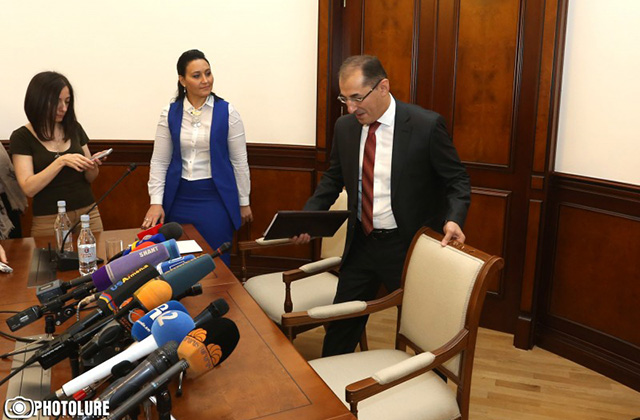Threat for exaggerated expectancies

No matter how much we insist that issues of in-depth economic changes in Armenia are political ones, and do not believe, that appointment of Karen Karapetyan in the PM’s position, together with his administrative skills, may lead to serious changes, it’s impossible not noticing one thing: there is certain level of trust and optimism towards the newly appointed PM.
It’s impossible to measure trust and optimism, however, obviously, it’s high as compared to the former Government. From personal contacts one may come to the conclusion that even rather pragmatic people express hope, that “at least something will be changed.” Thus, they don’t believe in in-depth changes, moreover quick ones, but they believe in positive changes. Or they want to believe.
Why is it good? It’s been repeatedly stated that productivity of any reform depends on trust towards the leadership, implementing that reform. Even the initiative born with most positive, most grounded and sincere aspirations can’t have a result, if the society attempts to observe a trap behind, i.e. the first idea is the following: “where do they intend to cheat us?” people consider the state not a partner, but a preventing circumstance. In this regard, trust developed towards the Government of Karen Karapetyan may play a role from the perspective of development of positive expectancies. And expectancies in economy have considerable importance.
However, there is the reverse of the coin as well. Exaggerated expectancies may even more worsen the situation and reach Karen Karapetyan’s reputation to zero. Particularly on the first days of his appointment some representatives of the leadership and people close to them were manifesting unprecedented enthusiasm.
If expectations from you are rather big, everything becomes complicated. If people anticipate for speedy changes, after a while not observing any result, they’ll speak even worse, than about his predecessor. In case of great expectations threat for deep disappointment is big as well. This threat, supposedly, Karen Karapetyan and his team have realized from the very first day. That’s why the newly appointed PM stated in his first speech that the condition of economy is rather hard. By this Karen Karapetyan put people in a rather inconvenient situation, who were assuring that affairs are more than good. However, there is no any other option: it’s worth saying that it’s very bad, so that people didn’t demand the good.
The next signal of not waiting for speedy changes was given through budget draft 2017. It was stated that a rather tough budget will be available, expenditures will be considerably reduced, i.e. we pass on to economy mode. Finance Minister Vardan Aramyan developed PM’s idea. “It’s very difficult looking into the eyes of the pensioners and say that pensions won’t be increased,” he said. Yes, in fact, it’s very difficult, in particular, for people, expectations from whom are great.
Aramyan compared economy with human organism, which is being exhausted form the wind, and when the pill is taken, recovery doesn’t take place immediately, i.e. our economy is sick, proper diagnosis was recently provided (the condition of economy is hard), and now we should take different pills, influence of which will be felt after some time only.
Naturally, after such allegations questions may arise: why did economy sicken? who’s guilt is it? and why we’re only now starting to “recover”? Thus, criticism is directed towards former Government.
At the same time, Vardan Aramyan attempted to prevent these questions, stating that hard situation (illness) is conditioned by imposing sanctions against Russia and reduction in price for raw materials. Accordingly, the Government had no part of guilt. As for the treatment, “If the Government didn’t undertake measures, the result would have been negative.” Thus, we started taking pillows yet in the period of former Government, however, currently we pass on to intensive treatment. Moreover, the result of intensive treatment will be touchable no sooner than from 2018. To record ascension, according to Aramyan, 4.4% economic growth is necessary, and pursuant 3.2% growth is anticipated budget 2017.
Aramyan’s statement is just the small part of reality. Budget draft 2017 contains more detailed data on anticipated developments. Pursuant functional classification of budget expenditures, as compared to confirmed indices on law on state budget for 2016, budget allocations for 6 fields out of 11 will increase, those of 5—will decrease.
Budget financing will reduce in the following directions: economic relations (less by AMD 21 billion), apartment construction and communal services (-AMD 15 billion), healthcare (-AMD 2.7 billion), recreation, culture and religion (-AMD 697million), education (-AMD 17.5million). Upon draft budget 2017 it’s anticipated that against the background of economic growth, investment level will continue reducing. In 2015 investment level comprised 20.8% of GDP, and by the end of ongoing year will reduce up to 20.2%, and in 2017 it’ll reach 19.1%. Consumption level will reduce by 0.2pp—reaching from GDP 90.4% to 90.2 %.
By different fields the highest growth temp in 2017 will be recorded by industry—5.5%. Agriculture, upon Government anticipations, will grow by 4%, services—2.8%. Construction will finally overcome the decline and will record zero growth. State debt will continue growing and etc.
These anticipated changes, surely, can’t be called brilliant ones. For this very reason the Finance Minister calls 2017 a year of stability, which may also be comprehended as a preparation year. In short, the Government asks for one year period. And it’ll become clear in next April, by NA election results, whether Karen Karapetyan’s Government will be provided this much time or not.
By Babken Tunyan

























